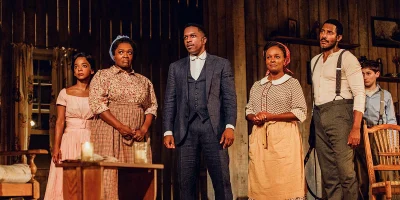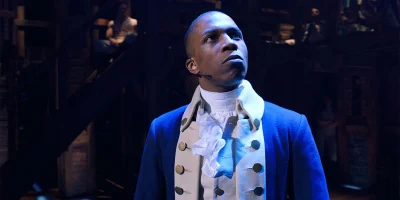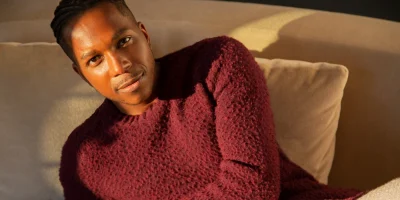
The real history behind ‘Purlie Victorious’ on Broadway
Discover how real-life people, places, and politics shaped Ossie Davis’s uproarious comedy from 1961, which remains just as fresh and relevant in 2023.
Sometimes the dividing line between a character and a playwright is a blurry one. So it is with Ossie Davis’s 1961 satirical comedy Purlie Victorious: A Non-Confederate Romp Through the Cotton Patch, now back on Broadway for the first time since its debut 62 years ago.
The story follows Purlie Victorious Judson, a Black self-made traveling preacher who returns to his segregated Georgia hometown with a mission to buy and rehab its derelict church, Big Bethel. As a Black man, that’s a tall order. The church, like the town, is in the grip of racist tyrant Ol’ Cap’n Cotchipee.
Davis grew up in racially segregated Georgia. Like Purlie, Davis had first-hand experience with discrimination and bigotry, forces that inform the play and fueled his lifelong commitment to civil rights. In a pre-show voiceover, director Kenny Leon notes that the play began as an angry drama. But it evolved to become less autobiographical and funnier. Get people laughing, you get people’s attention. That’s powerful.
Learn more about the political and personal contexts – and the impact of 1960s-era influences – that shaped Purlie Victorious below.
The politics of Purlie Victorious
Davis situated his play in Georgia in the late 1950s, a time when Jim Crow – which has been called “a racial caste system” – were in effect in the American South. Bottom line: Blacks were second-class citizens.
“Jim Crow was more than a series of rigid anti-black laws. It was a way of life,” according to the Jim Crow Museum, a resource to tell the story of African American resiliency. Jim Crow bolstered the lie that Blacks were inferior to whites.
Davis shrewdly creates Ol' Cap'n Cotchipee to be the flesh-and-blood manifestation of Jim Crow, a man dressed head to toe in white who won’t hesitate to say he reveres “all that is white and holy” – and that doesn’t include African Americans. He sums the philosophy up in a chilling line: "My ol' Confederate father told me on his deathbed: Feed the Negras first - after the horses and cattle."
Cotchipee is quick to reach for his bullwhip, but he takes a shine to Purlie’s brother Gitlow (that name is no accident), an “Uncle Tom” who’s content being subservient and keeping to the old-plantation-day ways.
But Davis leaves room for hope. Cotchipee’s liberal-minded son Charlie has had it with his father’s bigoted ways – and that ultimately leads the way for Purlie to get the last laugh.
The real-life partnership of Purlie Victorious
Purlie’s plan to take ownership of Big Bethel requires a secret weapon – Lutiebelle Gussie Mae Jenkins, a follower and love interest of Purlie's who’s game for anything. Ossie Davis played the title role in the comedy’s Broadway premiere, so naturally, his wife, Ruby Dee, played Lutiebelle.
The couple, who were married for 57 years, previously shared a Broadway stage in 1946 in Jeb and 1959 in A Raisin in the Sun. Purlie Victorious gave them a chance to chomp into two juicy roles together onstage. And their involvement in the show didn't end with the original production: Dee later played the supporting role of Idella in a 2002 reading.
They frequently worked together throughout their careers until he died in 2005 at 87; she died in 2014 at 91. But Purlie Victorious gave them a unique chance to shine a bright spotlight on the struggle for equality.
Famous Purlie Victorious reviews
Suffice it to say that the social influencers of 1961 took notice of what Purlie Victorious was preaching. Fellow reverend Martin Luther King, Jr. saw the show. So did Malcolm X. According to Davis, X said, “Black folks laughing at White folks was revolutionary — the highest kind of struggle he could imagine.”
Eleanor Roosevelt also attended. She laughed, and then she wrote about the experience. “Mixed with the humor there is intelligent, incisive commentary on segregation, discrimination, and the slow pace of integration,” she wrote.
“I think it is well for you as an American citizen to see it,” she added, “and ponder our racial problem… as a question affecting our standing and our real sincerity among the peoples of the world.”
Call that a Purlie of wisdom.
Photo credit: Kara Young, Heather Alicia Simms, Leslie Odom, Jr., Vanessa Bell Calloway, Billy Eugene Jones, and Noah Robbins in Purlie Victorious. (Photo by Marc J. Franklin)
Frequently asked questions
What is Purlie Victorious on Broadway about?
Hamilton Tony Award winner Leslie Odom, Jr. returns to Broadway in the first revival of Ossie Davis's sharp comedy. See him as a preacher who returns to his Georgia hometown to reclaim his inheritance, free enslaved workers, and save his congregation.
Where is Purlie Victorious on Broadway playing?
Purlie Victorious on Broadway is playing at Music Box Theatre. The theatre is located at 239 West 45th Street (between Broadway and 8th Avenue), New York, 10036.
How long is Purlie Victorious on Broadway?
The running time of Purlie Victorious on Broadway is 1h 40m
What's the age requirement for Purlie Victorious on Broadway?
The recommended age for Purlie Victorious on Broadway is 12+ is recommended. Children under 4 years old will not be admitted..
How do you book tickets for Purlie Victorious on Broadway?
Book tickets for Purlie Victorious on Broadway on New York Theatre Guide.
Who wrote Purlie Victorious?
Ossie Davis wrote Purlie Victorious, which marked his Broadway debut as a playwright in 1961. A veteran performer, he also played the title character.
Who directed Purlie Victorious?
Tony Award winner Kenny Leon directs Purlie Victorious. His best-known directing credits include A Soldier's Play, Topdog/Underdog, and A Raisin in the Sun.
Is Purlie Victorious appropriate for kids?
Purlie Victorious is suitable for all ages. The show does deal with themes including racism and enslavement. Please note that children 4 and younger are not permitted in Broadway theatres.
Is Purlie Victorious good?
Purlie Victorious received acclaim from famous figures like Martin Luther King, Jr. and Eleanor Roosevelt upon its premiere, and it has since gone down as a classic. With Tony Award-winning talent at the helm, this revival promises to be nothing less than funny, smart, and memorable.
Originally published on




